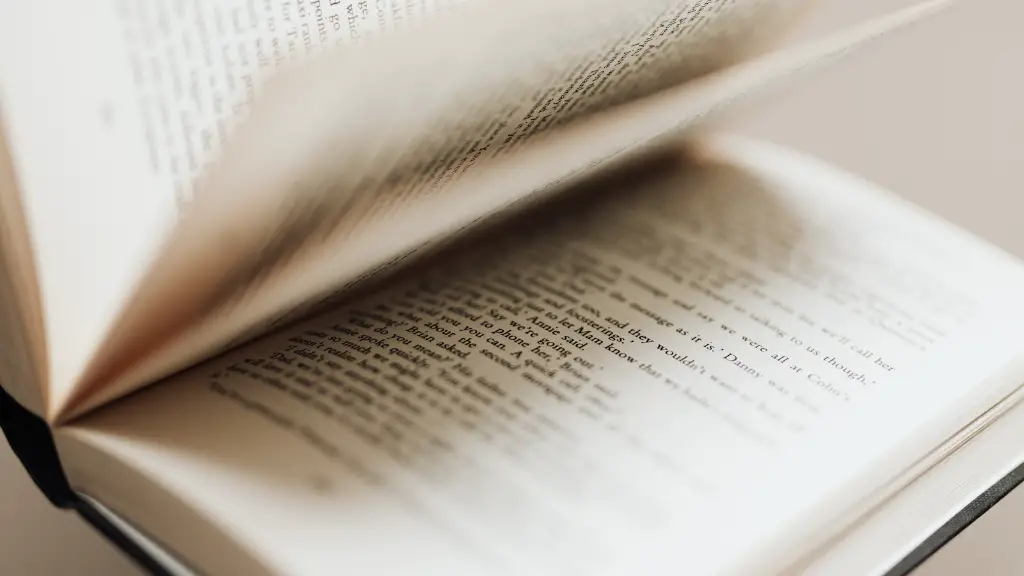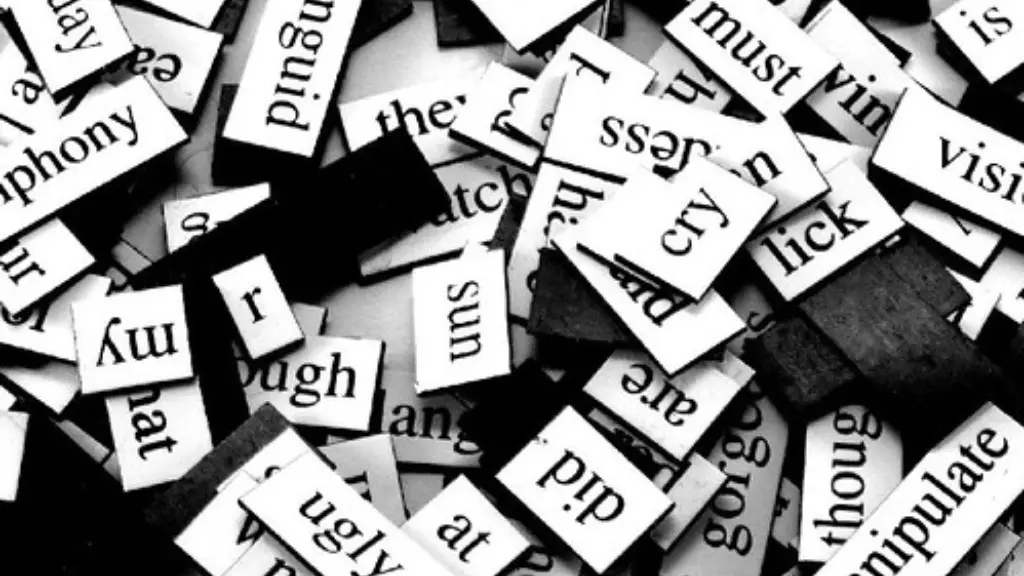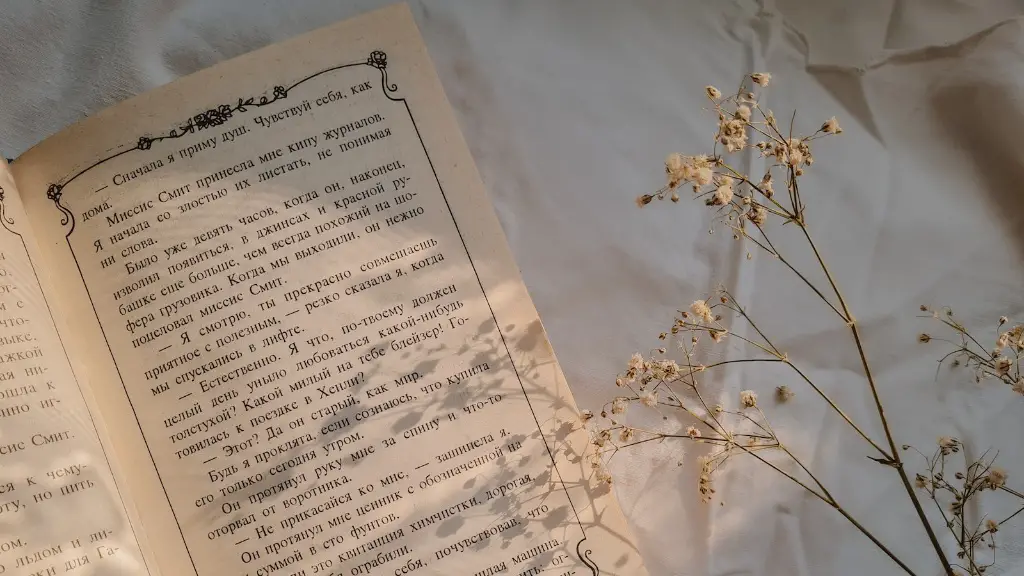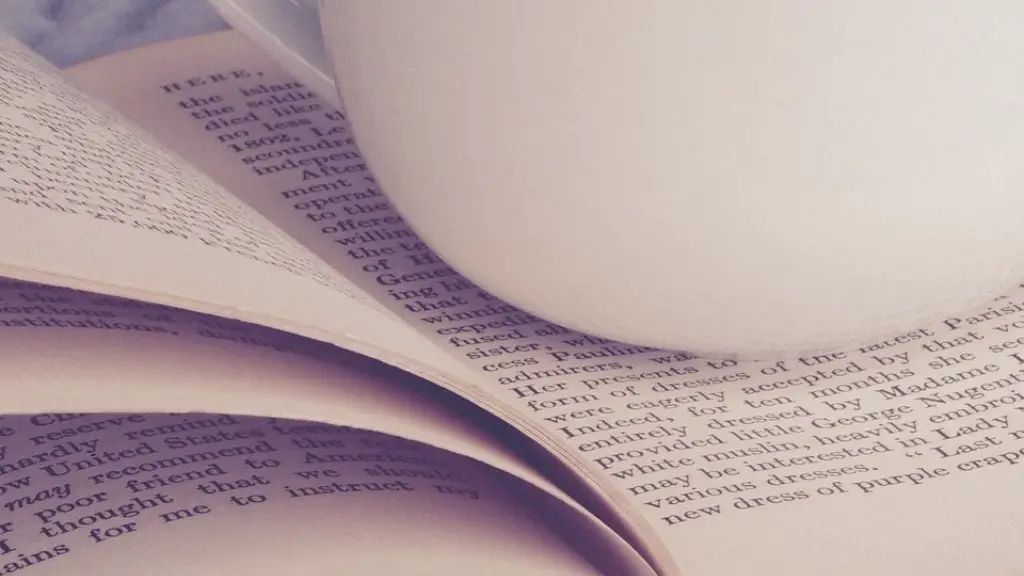Some would argue that the terms poem and poetry are interchangeable, however, others would say otherwise. While it is true that both poetry and poem often refer to the same art form, there are some distinct differences between them. To understand the distinction, it is helpful to consider the definition of both terms.
In the Oxford English Dictionary, a poem is defined as “a piece of writing organized in lines” and poetry is defined as “the art of writing such pieces.” Simply put, a poem is a specific type of writing within the larger category of poetry. A poem could be considered a “finished” work, while poetry is a concept that encompasses the entire art form.
The distinction between a poem and poetry is further complicated by the various types of poems which are often applied to poetry. For example, many people recognize the distinct elements and structure of a sonnet, haiku, villanelle, ballad, or other poetic forms. While these are all types of poems, they are also all part of the larger art form of poetry. This can make it difficult to differentiate between the two.
In an article in The Atlantic, Wallace Gray defines the differences in terms of creation and composition. Gray explains that a poem is the act of writing, while poetry is the result of that act. He states, “Poem-making is a verb. Poetry is a noun.” This distinction highlights the idea that a poem is a written piece, while poetry is the category that encompasses all the various poems of a culture.
This distinction can be further explored from a literary criticism perspective, with poetry being considered a part of the larger literary tradition. According to literary theorist Daniel Albright, this tradition “includes, among other things, certain sorts of variation on existing forms, certain sorts of experiments, certain kinds of patterning, and certain manners of technical manipulation of language.” In this way, poetry is a larger concept or practice which includes many various forms of creative expression, while a poem is a single work.
The differences between a poem and poetry can also be seen in the way they are experienced by readers. While a poem may elicit a variety of emotions in the reader, poetry as a whole can be thought of as a type of creative expression or form of art. By understanding the unique qualities of a poem and the larger concept of poetry, readers can gain a deeper understanding of the text they are reading.
Social and Political Implications
The distinction between a poem and poetry can have important implications when it comes to the social and political messages conveyed in these works. From a historic perspective, poetry has been used to express and question cultural norms, make commentary on society, and challenge established conventions. In this way, poetry can be seen as a powerful tool for social change.
However, the same can be said for individual poems, regardless of their place in the larger context of poetry. Through the written words of a poem, powerful messages can be conveyed, sparking critical conversations and inspiring readers to take action.
The distinction between a poem and poetry has implications when it comes to the accessibility of literature, as well. While a poem may be considered a “finished” work, it is also part of a larger collection of pieces that come together to form a larger work of poetry. Making the distinction between a poem and poetry can help to create a more inclusive literary environment, where all types of readers are equally represented and catered to.
While there are some distinct differences between a poem and poetry, this does not diminish the beauty of either one. Both works can be seen as expressions of beauty, emotion, and creativity that have the power to move readers in profound ways. As such, it is important to recognize and appreciate the unique qualities of each form of creative expression.
International Flavors
Although the concepts of poem and poetry are often used interchangeably, the distinction between them has implications on an international level. As the art of writing poems has existed since ancient times in various cultures, the concept of poetry has evolved over time and varies greatly depending on the region. As such, a single poem may take on different meanings in different parts of the world.
For example, the use of rhyme and meter is more common in Western poetic traditions, while in other parts of the world, rhythm and tone play a more prominent role in poetic expression. This has implications for how a reader may interpret a poem, as different cultures often place their own meanings and interpretations on pieces of literature, regardless of their origin. As such, it is important to be aware of how a particular poem may be interpreted differently depending on location.
It is also worth noting the influence of language on the individual poem and the larger concept of poetry. Language can have a profound impact on the way a poem is understood and the emotions it may evoke in a reader. As such, it is important to recognize the importance of language and its role in the creation of poems, as well as its role in conveying meaning and understanding in the larger context of poetry.
Style and Influence
The distinction between a poem and poetry can also be seen in terms of style and influence. Although there are some common characteristics and elements that many poems share, each work has its own unique style and characteristics. This is what makes poetry so captivating—the fact that it is a form of creative expression that can be truly unique and personal.
Additionally, poets often draw influence from other forms of literature and art, and this can also be seen in the individual poem. For instance, a poem may include references to mythology, history, philosophy, or popular culture, which can help the reader to better understand the underlying message of the poem. In this way, a poem may be used to explore a range of topics, from the most personal to the most universal.
Poetry has also been used to capture the essence of a particular moment in time, or to express complex ideas in a compact form. This is perhaps one of the most enduring aspects of poetry, and it is something that many readers can relate to, regardless of their cultural background.
Evolution and Meaning
The evolution of poetry is an ongoing process, and the English language has played a significant role in this evolution. As language changes and evolves, so too do the individual poem and the larger conception of poetry. For example, the use of language in poetry has changed dramatically over the centuries, from more traditional forms such as sonnets and villanelles to modern forms such as free verse and spoken word.
At the same time, the meaning of a poem can also change over time. Poems often serve as a reflection of the culture and society in which they were created, and this can shape their interpretation and meaning. As such, it is important to consider the context in which a poem was written and the influence this has on its interpretation.
Finally, it is also worth noting the importance of tone and emotion in the interpretation of a poem and the larger concept of poetry. Although a poem may be seen as a “finished” work, it has the potential to be interpreted in a variety of ways, depending on the reader’s emotional state. As such, it is important to consider the impact of emotion in the interpretation of a poem and the larger concept of poetry.
Reflection and Purpose
The distinction between a poem and poetry can also be seen in terms of purpose and reflection. While a poem often serves as a creative outlet for the author to express their thoughts and feelings, poetry can also be used to explore larger topics and themes. Additionally, poetry can provide readers with a way to reflect on their own experience, as well as contemplate ideas and concepts that may be unfamiliar or challenging.
The purpose of poetry can also be seen in how it influences readers and encourages them to think in new and creative ways. By reading and interpreting a poem, readers can reflect on their own beliefs and opinions, as well as gain a better understanding of the world around them. In this way, poetry can be used as a vehicle for social change and as a way to explore a range of topics and ideas.
Through considering the difference between a poem and poetry, it is possible to gain a greater appreciation for both forms of literature and the many complex ideas and emotions they convey. From understanding the definitions and distinctions between the two to discovering the purpose and influence of each, one can begin to understand how poetry can be effectively used to express powerful messages and emotions.





